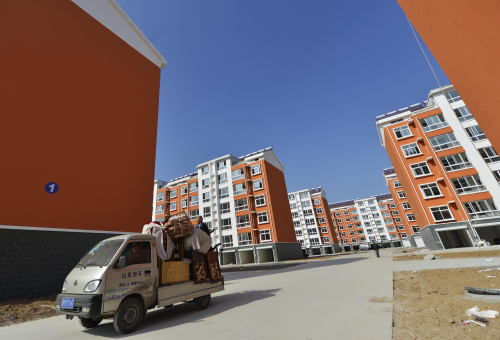|
 |
|
NEW HOME: A residential community has been built for local farmers in Niujiacun Village, Zouping County of Shandong Province (XINHUA) |
"This is a good start for confining government power. The viability of businesses will be tremendously increased. As long as every business is dynamic, the government won't be so concerned about the GDP growth rate as it is now," Fan noted.
Lowered threshold
In addition to the reduction of red tape, the improvement of China's business environment is also attributable to an array of reform measures aimed at removing restrictions for private capital.
On March 1, central authorities lifted business registration restrictions on minimum registered capital, payment deadlines, down payment ratio and cash ratio of registered capital, a move aimed at facilitating entrepreneurship.
By virtue of the new policy, the number of newly registered companies increased 56.48 percent year on year from March to September. On average, 10,500 companies were set up every day, according to data from the State Administration for Industry and Commerce.
Reform on China's state-owned enterprises (SOEs) has been accelerated to give more investment opportunities to private capital.
In July, six large SOEs were chosen to pilot reforms in ownership, management and supervision. State-owned behemoths, such as China National Petroleum Corp. and China Telecom, have carried out their own plans to diversify corporate ownership and attract private funds.
On September 12, China Petroleum and Chemical Corp. (Sinopec), the country's largest petroleum refiner and oil product manufacturer, announced that its wholly owned subsidiary Sinopec Marketing Co. had entered into a capital injection agreement with 25 domestic and foreign investors.
Song Xiaowu, a senior advisor to the China Society of Economic Reform (CSER), believes reforms on SOEs are quite necessary.
"SOEs have made tremendous achievements during the past three decades, but that's because of their intertwined relationship with the government and the resulting privileges or even monopolistic status in the market," Song said. "The government should be separated from the operation of businesses, and mixed ownership of SOEs can help realize that goal."
Mixed ownership can also help vitalize state capital, unleash the potential of private capital and accelerate the overseas expansion of China's SOEs, Song added.
Song, however, warned that mixed ownership can't solve the problem alone. "There should be a wide variety of supporting measures for the scheme. First, a sound market order should be established where the buying and selling of shares in SOEs should be fair and transparent. Also, the corporate governance structure in SOEs should be improved and SOEs should hand in more profits to the country," Song said.
According to Song, 50 to 60 percent of SOEs' profits are handed in to the government in Western countries, but in China the proportion is still very low.
Challenges remain
Peng Sen, President of the CSER, said that the reform process ahead is full of trials and tests.
"The Central Government is undoubtedly determined and steadfast about reforms. Although it has mapped out a detailed and thorough plan for future reforms, some local governments are hesitant on the implementation of those plans, for fear of causing chaos or in order to defend interest groups," Peng said.
According to Peng, though the government has made great achievements in cancelling administrative approval procedures, it's still not enough.
"The government still intervenes too much with the market. In contrast, public services, social management and market regulation are all severely lacking, whereas those areas should have been the focus of government efforts," he said.
| 